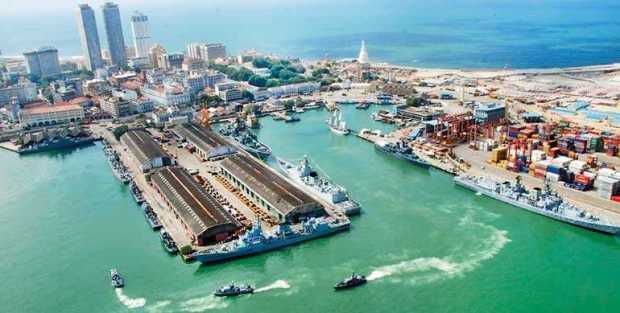By P. K. Balachandran
COLOMBO – Indian Foreign Minister S. Jaishankar has told the Sri Lankans that India wants Sri Lanka to view Indian involvement in the Eastern Container Terminal (ECT) in Colombo port as a Foreign Direct Investment (FDI) in a Joint Venture with Japan and the Sri Lanka Ports Authority (SLPA), a top Sri Lankan government official said.
This assertion is significant given the Sri Lankan nationalist opposition to involving ‘India’ in the construction and running of the ECT. Contrary to the general presumption that the Indian State is taking a stake in the ECT, the Indian partner in the Joint Venture with Sri Lanka and Japan will be a private company (presumably the Adanis).
Jaishankar was in Sri Lanka on a three-day trip from January 5 to 7.
The Indian line is entirely in accord with the policy of the Sri Lankan President Gotabaya Rajapaksa, who has told every visiting foreign dignitary, including the Chinese, that Sri Lanka would like to have investments rather than loans for its development.
Twenty seven trade unions instigated by the ultra-nationalistic (basically anti-India and anti-West) Janatha Vimukthi Peramuna (JVP) have been agitating against the deal on the grounds that it is a “sell-out” of a national asset to India.
The workers are now trying to rope in Buddhist monks, a strong nationalistic group, in their campaign, the official said. If the Buddhist monks join, the ruling Sri Lanka Podujana Peramuna (SLPP) will be in a fix as the monks are an important part of its core Sinhala-Buddhist electoral constituency.
The JVP and the workers are exploiting the fact that the ruling SLPP had come to power in the November 2019 presidential election and the August 5 parliamentary elections with a pledge that it’s government will not barter away national assets like ports and airports to other countries. Such a pledge was given following SLPP’s trenchant criticism against the leasing out of the Hambantota port to a Chinese company. The Chinese company was granted a stake of 85% and the lease was for 99 years.
However, government now feels this principle about not giving national assets to foreign entities cannot be applied uniformly across the board covering all foreign investments. As a top official put it, “If no foreign entity is allowed to use a national asset, Sri Lanka will not get any foreign investment!”
As envisaged in the May 2019 Memorandum of Cooperation (MoC) on the ECT between India, Sri Lanka and Japan, the Sri Lanka Ports Authority (SLPA) was to have 51% share in the company to be formed for the management of the terminal; India was to get 15%, and the rest was to be held by Japan, which was to give a loan at 0.1% interest. From the Indian side, the investor was to be, Adani though this was not acknowledged publicly.
However, in 2020, after the change of government, port workers instigated by the JVP, went on strike against the “sell out” to India and disrupted work in the port, which was already suffering from congestion.
Speaking to a local English language weekend paper, the Deputy General Secretary the All Ceylon General Ports Employees’ Union (ACGPEU), G. Niroshan, said as per the cabinet proposal submitted by Minister of Ports, Rohitha Abeygunawardena, the government was planning to hand over the operation to India’s Adani Group. Even though the MoC of 2019 says the ECT would be operated by India, Japan, and Sri Lanka, it is revealed that India is trying to take the majority of the shares and gain full control of the terminal, the union leader alleged
On the claim made by the authorities that only 49% of the shares would be given to India and Japan and the rest would be in the hands of the SLPA, trade union members stressed that the ECT should be kept with the SLPA. Not even 1% should be handed over to India, they insisted.
Prime Minister Mahinda Rajapaksa met the workers and assured them he would not sell away ECT to any foreign entity. Last week, he reiterated this in Parliament, and charged the earlier government of entering into the MoC without consulting the ports ministry. But he was wrong there. The MoC was signed by the then Minister of Ports Sagala Ratnayake.
Later, Mahinda Rajapaksa told Parliament there was no decision to vest the ECT in its entirety or partially with a foreign entity or to hand over its management. Rajapaksa omitted mentioning that the May 2019 MoC did not mean the ECT would be owned by foreigners. It would be owned by the SLPA with 51% majority stake.
According to the Chairman of the SLPA, Maj. Gen. (Rtd) Daya Ratnayake, two committees are looking into various issues involved in the development of the ECT and among the issues was the possibility of including Sri Lankan companies as partners. John Keells is already partnering SLPA in running a terminal in Colombo port, the South Asia Gateway Terminal (SAGT).
A top official said these committees would have to finish their work quickly as there is an urgent need to finish the construction of the ECT. Due to overcrowding and the shortage of workers due to COVID restrictions, many container vessels have been by-passing Colombo port denying the latter much needed income, shipping industry sources said.
Meanwhile, the government is gearing itself for a showdown with the workers’ unions in case they go on strike again. Recently it declared port work as an essential service thereby making strikes illegal.
– P K. Balachandran is a senior Colombo-based journalist who in the past two decades, has reported for The Hindustan Times, The New Indian Express and the Economist


